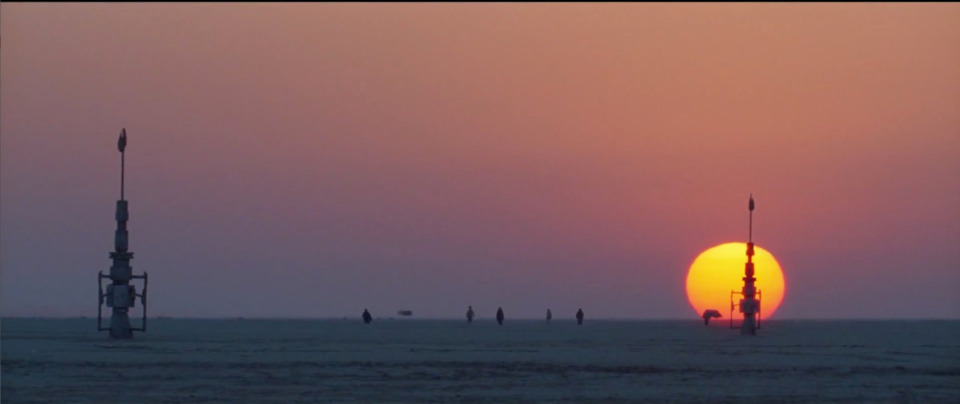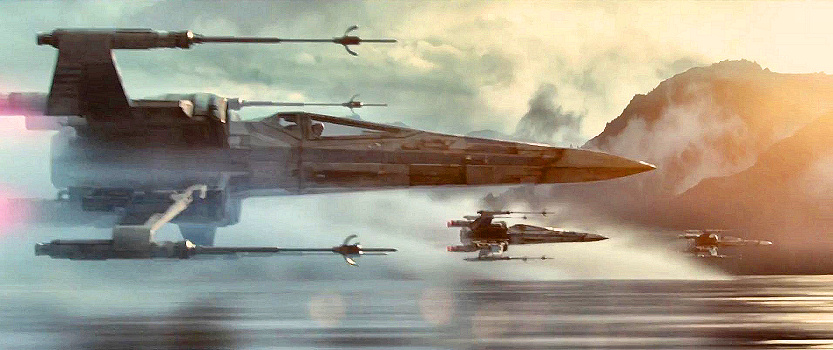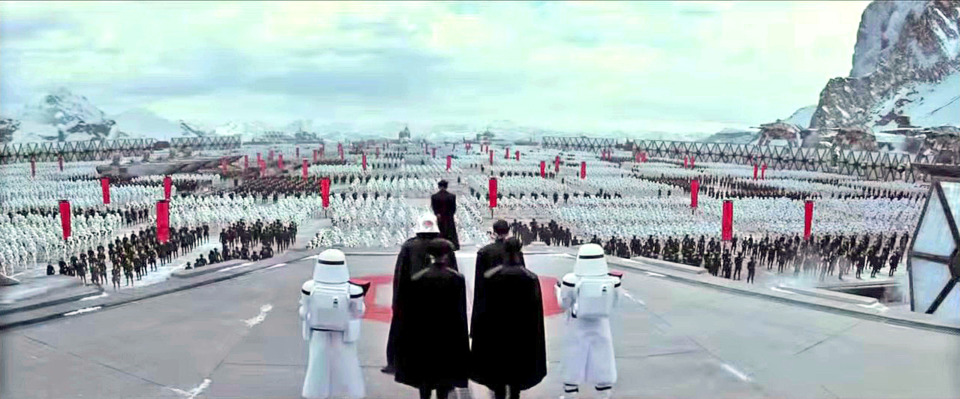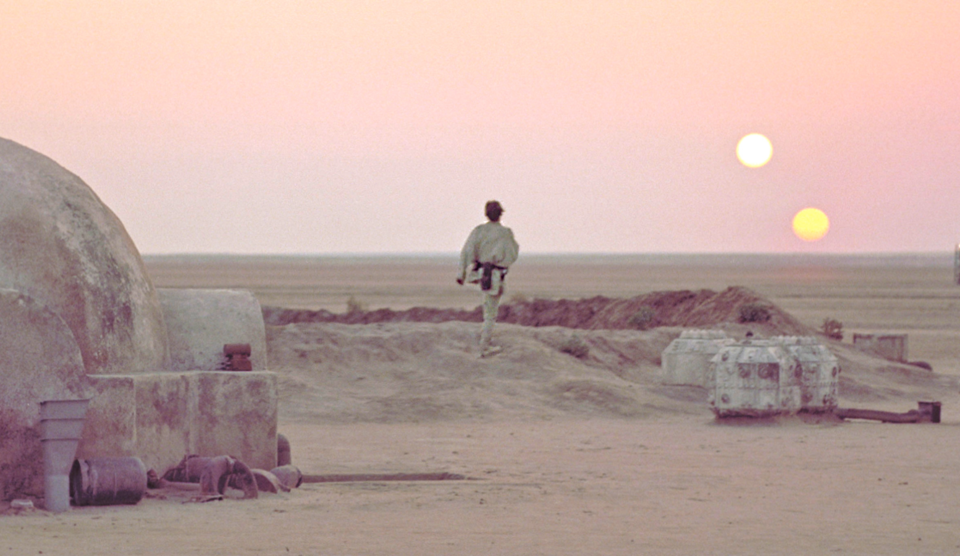Welcome to Off the Clock, my weekly column about the stuff I've been doing while out of the office. Among other things I did over my holiday break, I spent some of my free time watching and thinking about…
Star Wars Episode VII: The Force Awakens

(Heads up, I’m going to talk frankly and openly about elements of The Force Awakens.)
After my first viewing of The Force Awakens, on my way out of the theater, I rushed to tweet a joke I’d been holding back throughout nearly the whole film: “Star Wars: Episode VII: The Millennials Will Be Okay.” I say “joke,” but like a lot of jokes based in observation, I kind of meant exactly what I said. It seemed like an obvious reading. The major members of the new “generation” of Star Wars characters--Rey, Finn, and Kylo Ren--all stood in the shadow of a past in different ways. Or said differently, each is a sort of “fan” of the same Star Wars stories that we know and love, and they all find themselves struggling with the canon.
Towards the start of the movie, Rey’s fandom is on full display in the form of a vintage X-Wing helmet and a doll of a rebel pilot--probably Luke, whose sandy footsteps Rey seems to be following in. Finn, a First Order stormtrooper gone AWOL, struggles to distance himself from the group he was born into--a group that (despite a fairly complex history) likely conjures for the viewer only the image of faceless totalitarianism. Kylo Ren dwells on the good ol’ days of Darth Vader, frustrated like a 20-something who thinks that Baby Boomers are right about the rest of his lazy generation.
Like most of us in our own lives, each of these characters has a limited understanding of the universe, and especially of the past. What do other worlds look like? What was “the Galactic Empire” really? Is the Force real, and if so how does it work? Nowhere is this difference in understanding illustrated better than in how these characters view Han Solo: For Ren, he’s an uncaring father, for Finn, he’s a brilliant war hero, and for Rey he’s a legendary smuggler. Each finds their understanding challenged by a more complicated truth: Han was an absent dad because he cared so much; the great Rebellion war hero is a scoundrel without a plan; even seemingly invincible legends die.
In confronting the fact that the world might not quite be what they thought it was, these characters are unmoored from their senses of self. In some moments, Finn can’t seem to tell if he’s really just trying to escape the First Order or if he has nobler motives. Rey and Ren both struggle with their connection to the Force--the former wanting nothing to do with it despite aptitude, the latter wanting the control he thinks is his birthright. These dilemmas are pretty classic space opera, but look past the laser swords and they're not so different than the struggles of real people (millennial or otherwise). "Who am I and what the hell is my place in this world?" is the sort of question people have been asking themselves for as long as there have been people.
And this is where it gets interesting.
Beyond "The Hero's Journey"

While (depending on your feelings on metaphysics) the real world leaves us to try to find some subjective meaning for our lives, the world of Star Wars defines the roles of its inhabitants actively--or at least, it's supposed to. It's a universe that seems to present fundamental, inescapable truths. There is a Force that ties us all together. There is a moral Light side and a selfish, immoral Dark side.
The world of Star Wars is (or at least has been) filled with capital T "Truths." This is what made me turn on the series back in my late teens/early 20s. Despite growing up with the franchise, I stopped calling myself “a Star Wars fan” during the prequels. That was partly due to the quality of the those films, yeah, but also because the moralism of the series had begun to grate on me. I was moving into a period of my life where I became more interested in complex understandings of ethics and politics, and I was bored of reading again and again about how the Hero’s Journey was the One Way to Tell Stories, and I was especially frustrated by stories that wielded Good and Evil like hammers.
I stand by those developments in my thinking, but what I don’t stand by is the brash, Dawkins-esque elitism that they were accompanied by. That elitism led me to dismiss things I didn’t like instead of thinking about them. What a huge mistake. It was facile to dismiss that Star Wars morality as being “too black and white.” Yeah, of course it is--that's what they're going for. That shouldn't have been a stopping point for thought, it should've been a first step. Not only should I have asked “Why don’t I like this as much as I used to?” but also “What is it doing with this sense of morality and how does it do it?” Not just "Ugh, stop talking about the hero's journey," but "What is the academic heritage of Campbell's famous "monomyth," how does Star Wars utilize those things in a cinematic context? And to what end?"
That heritage is (among other things) a school of 20th century thought called Structuralism. Building on the work of linguist Ferdinand de Saussure and anthropologist Claude Levi-Strauss, structuralists identify and analyze what they see as common, foundational elements inside of any given set of human activity. While others in the field of linguistics were studying how a given language changed over time, Saussure was trying to figure out what was core to the way all languages must work. Levi-Strauss expanded on Saussure’s work, looking not only at human language but also at the structure of human stories and mythology. For both Saussure and Levi-Strauss, answering these questions about human activity was key to figuring out universal and intrinsic truths about humans.
Over the decades that followed, structuralist work expanded into analysis of economic, cultural, and political realms. It was often incredibly productive, since it gave people the tools to look not only at individual instances but also broader trends and practices. But structuralism eventually found pushback from folks who doubted that so much was truly "universal." Structuralist thought sometimes minimized real differences between different phenomena, and it often led to grand claims that prioritized the world views of the powerful and established. Some "post-structuralists" kept the toolset of structuralist analysis, but emphasized that the "structures" they were studying were ever-changing, not eternal: "Yes, we can analyze the structure of myths, but that changes as economic, social, technological, and emotional contexts do."
When I finally brought all of this to bear on Star Wars, I realized that it didn't only lean heavily on supposedly "universal" elements of myth-making, but also featured a fictional setting that itself presumes structuralism to be accurate. There is a fundamental organization and underlying structure to all sapient activity in Star Wars: The Force. And as Han says, "It's real, all of it." It's a claim that ancient alien bar-owner Maz Kanata supports, too: In a long enough timeline, "the same eyes appear in different people"--and whether she means that Star Wars characters are literally reincarnated or just that we're looking at a world of endless, thematic recurrence, the point is clear: There will always be a Luke and a Leia and a Darth Vader, even when they're a Rey and a Finn and a Kylo Ren.
Star Wars communicates its structuralism not only narratively, but also with a fierce cinematic cudgel. It hits you with black masks, with bright blue and red lasers, with orchestral swells, and with the sort of panoramic wide shots that seem to reach out and say “Yes, there is a transcendent, capital T Truth out there.” The lonely, desert sunsets of Tatooine and Jakku; the surge of heroism as an X-Wing squadron drifts in-formation over the waters and forests of Takodana; the Evil of General Hux's gathered mass of potential violence, his stormtroopers, his red banners, his technological supremacy, his eagerness to destroy populations we've barely met. At its highest points, Star Wars is crafted with such mastery that it is easy to convince oneself that it touches something fundamental to all humans, something eternal and real.
"A Man, Nothing More"

The Force Awakens does something surprising, though: It pairs all of this with techniques that destabilize and historicize. The film features endless panoramas, but also a jittery camera inside of a stormtrooper transport. Supreme Leader Snoke is a massive, growling personification of cruelty and ambition, but as his hologram diffuses so does our confidence that he is actually so threatening: Is he just another Wizard of Oz, someone who pulls all the right levers to convince us of his stature? And when General Hux delivers his speech, he isn't channeling some platonic form of Evil. He's channeling what we, the viewers, know and recognize from 20th Century fascism. His face carries the same combination of self-delusion and self-doubt that many ideologues wear--and Kylo Ren's does the same.
It was a surprise to see Ren's human face, and the reveal has been divisive. For many, it transformed a hateful, masked figure into an angsty little boy. Given the rest of the film's focus on destabilizing the mythic, I suspect that was the point. There is a similar scene towards the end of Knights of the Old Republic II: In the right circumstances, Darth Nihilius--a wordless being who devours the lifeforce of whole planets--can be unmasked to reveal what one of your companions describes as "a man, nothing more." The same could be said for Kylo Ren, or, in a way, even the mega-weapon that the First Order wields to devastating ends. Starkiller Base is not the mechanical, pseudo-moon monstrosity that the Death Star was. It is a planet converted into a weapon in the same way that Kylo Ren is a man converted into a killer The Force Awakens reminds us that evil doesn't need to look like any of the strange alien beings of the Star Wars galaxy. Sometimes it looks just like us.
This is a key thing to remember when considering the anxious response some have had about The Force Awakens' diversity and the heroic competence of Rey, the protagonist who some call a "Mary Sue" (and sometimes do such with the same temper-tantrum tones of an unmasked Kylo Ren). The film recognizes that the heroes of Hollywood--and thus the heroes of modern western mythology--have had wide appeal, but offer shallow representation. To twist Orwell: The stories of Luke, Leia, and Han are universal, but they're more universal for some than others. As much as Star Wars has spoken to a wide audience, it hasn't always spoken for that audience. To address this, the heroes of The Force Awakens are just as adept as the protagonists of the past, but now they're played by a much more diverse crew.
Between Hux's fascism and Ren's anger at Rey's natural prowess, The Force Awakens anticipated some of its most ardent critics well enough to personify them in the film. Ren's frustration is particularly ironic. He believes in a twisted meritocracy: Those who practice drawing upon anger and hate will one day learn utilize the force's full potential. When he is met with a person who--with no training--is able to outperform him, his worldview is so threatened that he takes drastic steps to try to reinforce it. But there are those in the world of Star Wars who are seemingly born with advantages others don't have, and this is as infuriating to Ren as it is to Rey's real life critics. Of course, this has been an uncomfortable fact about the world of Star Wars for as long as there have been Jedi, but before Rey, it went unchallenged. Suddenly, given the form of Daisy Ridley, old fans find an old truth undesirable.
Hux and Ren--and, I think, those angry fans--look backwards towards an elusive (and fictional) past where things were simpler, but The Force Awakens wants us to look forward instead, even though that might be challenging. The world is unfair, it says, and unstable. The things we thought were structural and eternal are in fact man-made and mutable. They're just very, very convincing. Addressing the challenges of the future will require not only people who are preternaturally skilled, like Rey, but also people like Finn, who will do what is needed when others refuse. I am thrilled that The Force Awakens is embracing this unsure future.
It is telling that the despite the heroic successes of its protagonists, the final moments of the film are not rendered in one of the series' bold, enveloping wide shots. Instead, we see Rey and Luke--his face intimating a well of history and thought and just a little confusion.
They stand on a hill on an island on a planet of oceans, the camera spinning around them in a wide, almost dizzy crane shot. The camera shakes, just slightly, hit by wind and a whispered doubt about what's to come.

I also spent some time over the break...
- Listening to: The Revenant: Original Motion Picture Soundtrack by Ryuichi Sakamoto, Alva Noto, & Bryce Dessner - If you like this, definitely go back and check out Sakamoto & Noto's previous work, too. I'm a big fan of Summvs.
- (Re)Reading: "The Anxious Defenders of Liberalism" by L. Rhodes - Rhodes is a deft writer and thinker who I find myself turning to again and again to help me think through contemporary politics. In this piece, he unpacks the long and complicated "political correctness" debate. The historical context is incredibly valuable.
- Playing: MechWarrior Online - I think I'm enjoying this? Or rather, I am definitely enjoying it, but the the real-money mech prices make me feel uncomfortable. That said, I haven't felt the need to put any cash into the game so far, and I think I'll be able to keep that streak going.
And A Question For You
Above, I wrote that Star Wars is able to use certain cinematic techniques to convey common feelings in a really evocative way. Can you think of any games that do this, whether with gameplay mechanics, controls, aesthetic design, or something else? If so, how do they do it? My favorite example of this is probably the way that Cart Life requires the player to purchase a watch in order to learn to make accurate predictions about travel times--without one, everything is unpredictable and incredibly stressful.
If I have time to, I'm also going to continue to collect and highlight my favorite comments at the end of the week. If you'd prefer your comment not be included in that post, let me know and I'll respect that.
242 Comments